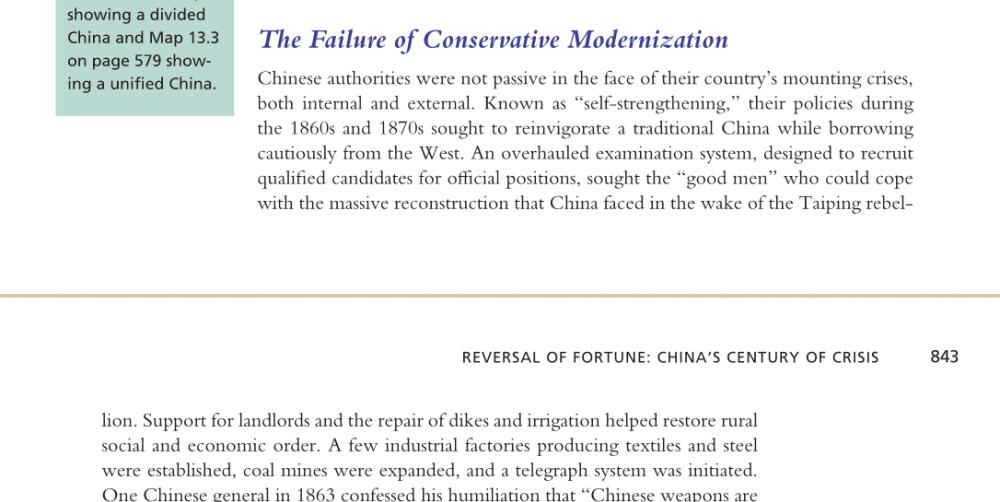To understand the actions of a country, it is necessary to understand how they view history. Understanding American history textbooks can help us better understand America today.
The following is an excerpt of a high school history textbook from a Texas public school:
In the face of increasingly serious crises at home and abroad, the Qing government was not passive. In the 1860s and 1870s, they pursued a policy known as "self-improvement," trying to revive traditional China while cautiously borrowing money from the West.
(原文:Known as “self-strengthening,” their policies during the 1860s and 1870s sought to reinvigorate a traditional China while borrowing cautiously from the West.)
They overhauled the examination system with the aim of recruiting qualified candidates for officials. Look for "good people" who can rebuild China on a large scale after the Taiping Rebellion. (The original "good men" translates more appropriately as "strongman.") )
(原文:An overhauled examination system, designed to recruit qualified candidates for official positions, sought the “good men” who could cope with the massive reconstruction that China faced in the wake of the Taiping rebellion)
The Qing government supported the landlords in repairing water conservancy projects and restoring social and economic order in the countryside. At the same time, a number of factories for the production of textiles and steel were established, the coal mines were expanded and the telegraph system was activated, while also being wary of the landlord class.

In 1863, a Chinese general admitted that "Chinese weapons are far inferior to foreign weapons." To compensate for this humiliation, the Qing government built many modern arsenals, shipyards, and foreign language schools.
But conservatives feared that urban, industrial or commercial development would erode the power and privileges of their landlord class, so they continued to hinder China's modernization and reforms.
In addition, the Qing Empire remained heavily dependent on foreigners in new industries such as machinery, materials, and science and technology.
The "self-reliance" movement strengthens local authorities that control these industries, not the central government.
The defeat of the "self-reliance" movement became apparent at the end of the century, when an anti-foreign movement known as the Boxer Rebellion (1898-1901) broke out in northern China.
Led by a militia that claimed to be righteous and harmonious, the Boxers killed many Europeans and Chinese Christians and surrounded foreign embassies in Beijing.
Later, the Western powers and Japan occupied Beijing and suppressed the rebellion. The Qing government agreed to pay huge sums of money to Western countries as punishment.
It is clear that China remains a vassal state of the West, largely under foreign control.
As a result, a growing number of educated Chinese, including many of the elites in official positions, were highly disillusioned with the Qing government.
Because the Qing government at this time was actually a government of foreigners, it was incapable of protecting China. By the end of the 1890s, these men had organized clubs, study groups, and newspapers to study the desperate situation in China and explore other paths.
The names of these organizations reflect their views — the Society for the Study of National Revival, the Association for the Preservation of Nationalities, and the Association for understanding national shame (what is this association, I didn't react for a while, so I literally translated it, and friends who know can type it in the comments section).
They admired not only Western science and technology, but also western political practices that limited the authority of rulers and allowed a wider range of people to participate in public life.
They believe that only a truly unified country in which the ruler and the ruled are closely related can China be protected from the erosion of foreign imperialism.
Despite the low number of women participating in these discussions, traditional gender issues remain a focal point. No one could answer this question more forcefully than Qiu Jin (1875-1907), the rebellious daughter of an aristocratic family who left her husband and two children to study in Japan.
After returning to China, she founded a women's magazine, believing that the liberation of women was crucial to the strength of the Chinese nation and participating in revolutionary politics.
The powerful forces of Chinese nationalism were born, and it was also directed against Western imperialism, the decadent Qing Dynasty, and traditional Chinese culture.
The Qing Dynasty's response to these emerging pressures proved inadequate.
In 1898, a progressive reform known as the "Hundred Days Reform" was suppressed by conservative forces. And the Qing government's move to end the imperial examination system and implement the national parliament came too late.
In 1912, China's last emperor abdicated. The ancient imperial order that ruled China for two thousand years collapsed.
This is the end of a long war and the beginning of a great struggle over China's future.